A clever malware deployment scheme first spotted in targeted attacks last year has now gone mainstream. In this scam, dubbed “ClickFix,” the visitor to a hacked or malicious website is asked to distinguish themselves from bots by pressing a combination of keyboard keys that causes Microsoft Windows to download password-stealing malware.
ClickFix attacks mimic the “Verify You are a Human” tests that many websites use to separate real visitors from content-scraping bots. This particular scam usually starts with a website popup that looks something like this:
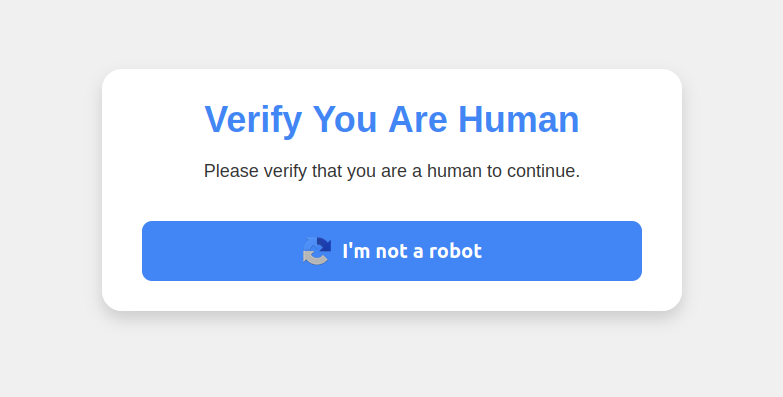
This malware attack pretends to be a CAPTCHA intended to separate humans from bots.
Clicking the “I’m not a robot” button generates a pop-up message asking the user to take three sequential steps to prove their humanity.

Executing this series of keypresses prompts Windows to download password-stealing malware.
Step 1 involves simultaneously pressing the keyboard key with the Windows icon and the letter “R,” which opens a Windows “Run” prompt that will execute any specified program that is already installed on the system.
Step 2 asks the user to press the “CTRL” key and the letter “V” at the same time, which pastes malicious code from the site’s virtual clipboard.
Step 3 — pressing the “Enter” key — causes Windows to download and launch malicious code through “mshta.exe,” a Windows program designed to run Microsoft HTML application files.
“This campaign delivers multiple families of commodity malware, including XWorm, Lumma stealer, VenomRAT, AsyncRAT, Danabot, and NetSupport RAT,” Microsoft wrote in a blog post on Thursday. “Depending on the specific payload, the specific code launched through mshta.exe varies. Some samples have downloaded PowerShell, JavaScript, and portable executable (PE) content.”
According to Microsoft, hospitality workers are being tricked into downloading credential-stealing malware by cybercriminals impersonating Booking.com. The company said attackers have been sending malicious emails impersonating Booking.com, often referencing negative guest reviews, requests from prospective guests, or online promotion opportunities — all in a bid to convince people to step through one of these ClickFix attacks.
In November 2024, KrebsOnSecurity reported that hundreds of hotels that use booking.com had been subject to targeted phishing attacks. Some of those lures worked, and allowed thieves to gain control over booking.com accounts. From there, they sent out phishing messages asking for financial information from people who’d just booked travel through the company’s app.
Earlier this month, the security firm Arctic Wolf warned about ClickFix attacks targeting people working in the healthcare sector. The company said those attacks leveraged malicious code stitched into the widely used physical therapy video site HEP2go that redirected visitors to a ClickFix prompt.
An alert (PDF) released in October 2024 by the U.S. Department of Health and Human Services warned that the ClickFix attack can take many forms, including fake Google Chrome error pages and popups that spoof Facebook.
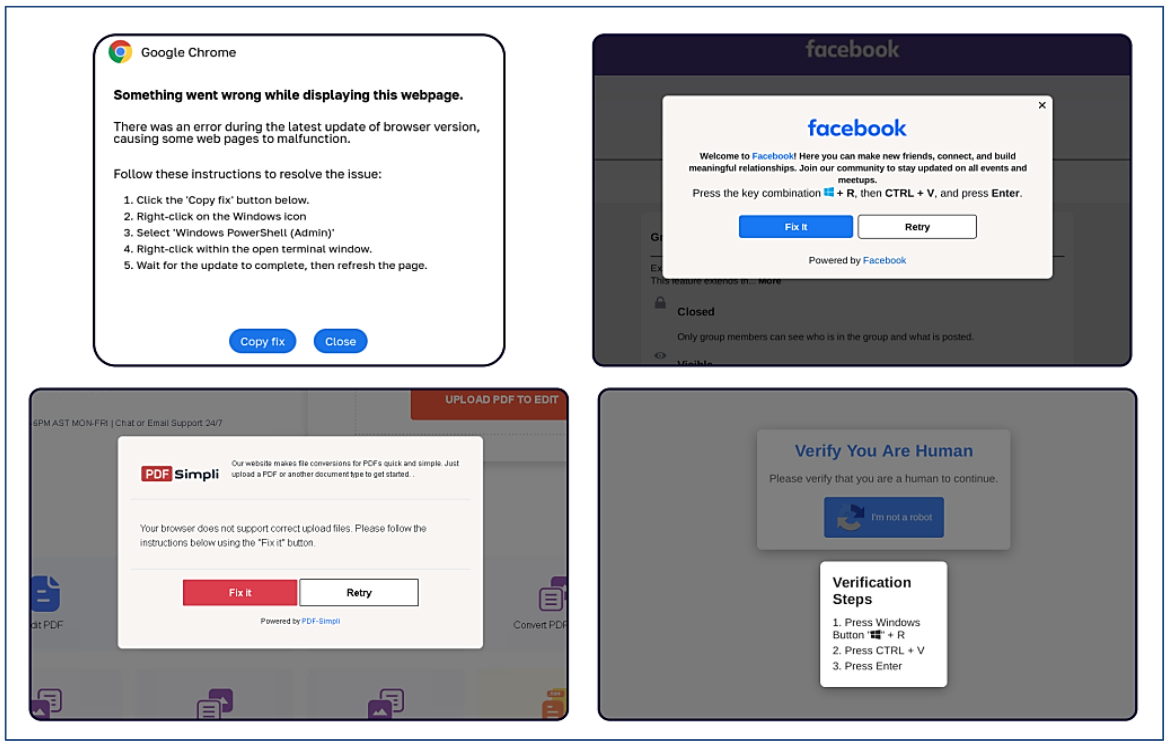
ClickFix tactic used by malicious websites impersonating Google Chrome, Facebook, PDFSimpli, and reCAPTCHA. Source: Sekoia.
The ClickFix attack — and its reliance on mshta.exe — is reminiscent of phishing techniques employed for years that hid exploits inside Microsoft Office macros. Malicious macros became such a common malware threat that Microsoft was forced to start blocking macros by default in Office documents that try to download content from the web.
Alas, the email security vendor Proofpoint has documented plenty of ClickFix attacks via phishing emails that include HTML attachments spoofing Microsoft Office files. When opened, the attachment displays an image of Microsoft Word document with a pop-up error message directing users to click the “Solution” or “How to Fix” button.
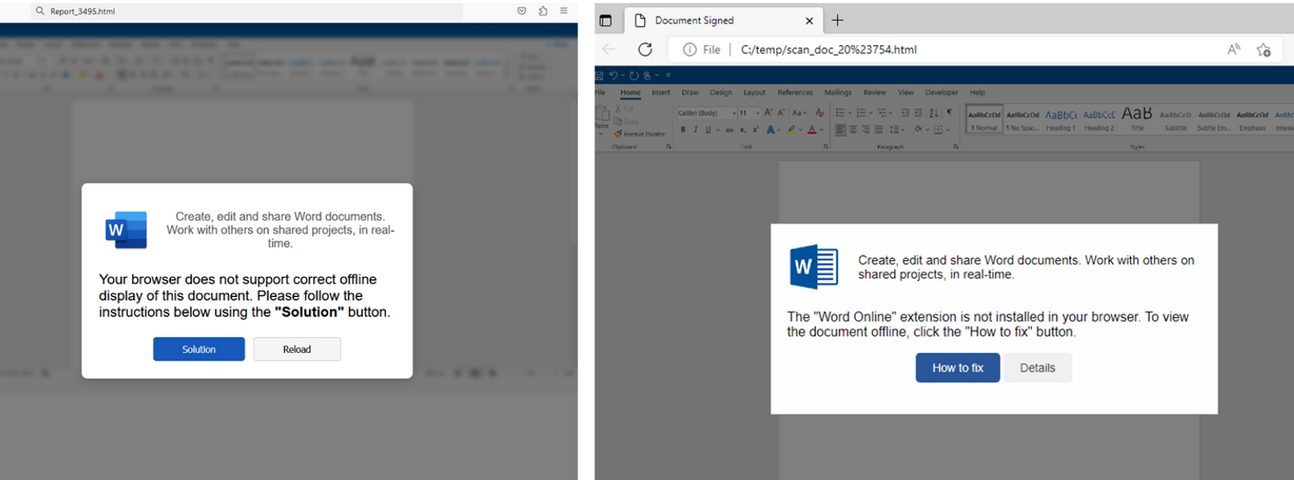
HTML files containing ClickFix instructions. Examples for attachments named “Report_” (on the left) and “scan_doc_” (on the right). Image: Proofpoint.
Organizations that wish to do so can take advantage of Microsoft Group Policy restrictions to prevent Windows from executing the “run” command when users hit the Windows key and the “R” key simultaneously.
A number of cybercriminal innovations are making it easier for scammers to cash in on your upcoming travel plans. This story examines a recent spear-phishing campaign that ensued when a California hotel had its booking.com credentials stolen. We’ll also explore an array of cybercrime services aimed at phishers who target hotels that rely on the world’s most visited travel website.
According to the market share website statista.com, booking.com is by far the Internet’s busiest travel service, with nearly 550 million visits in September. KrebsOnSecurity last week heard from a reader whose close friend received a targeted phishing message within the Booking mobile app just minutes after making a reservation at a California hotel.
The missive bore the name of the hotel and referenced details from their reservation, claiming that booking.com’s anti-fraud system required additional information about the customer before the reservation could be finalized.
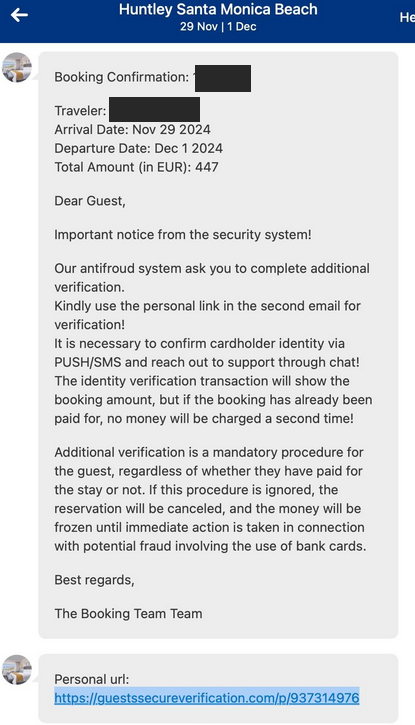
The phishing message our reader’s friend received after making a reservation at booking.com in late October.
In an email to KrebsOnSecurity, booking.com confirmed one of its partners had suffered a security incident that allowed unauthorized access to customer booking information.
“Our security teams are currently investigating the incident you mentioned and can confirm that it was indeed a phishing attack targeting one of our accommodation partners, which unfortunately is not a new situation and quite common across industries,” booking.com replied. “Importantly, we want to clarify that there has been no compromise of Booking.com’s internal systems.”
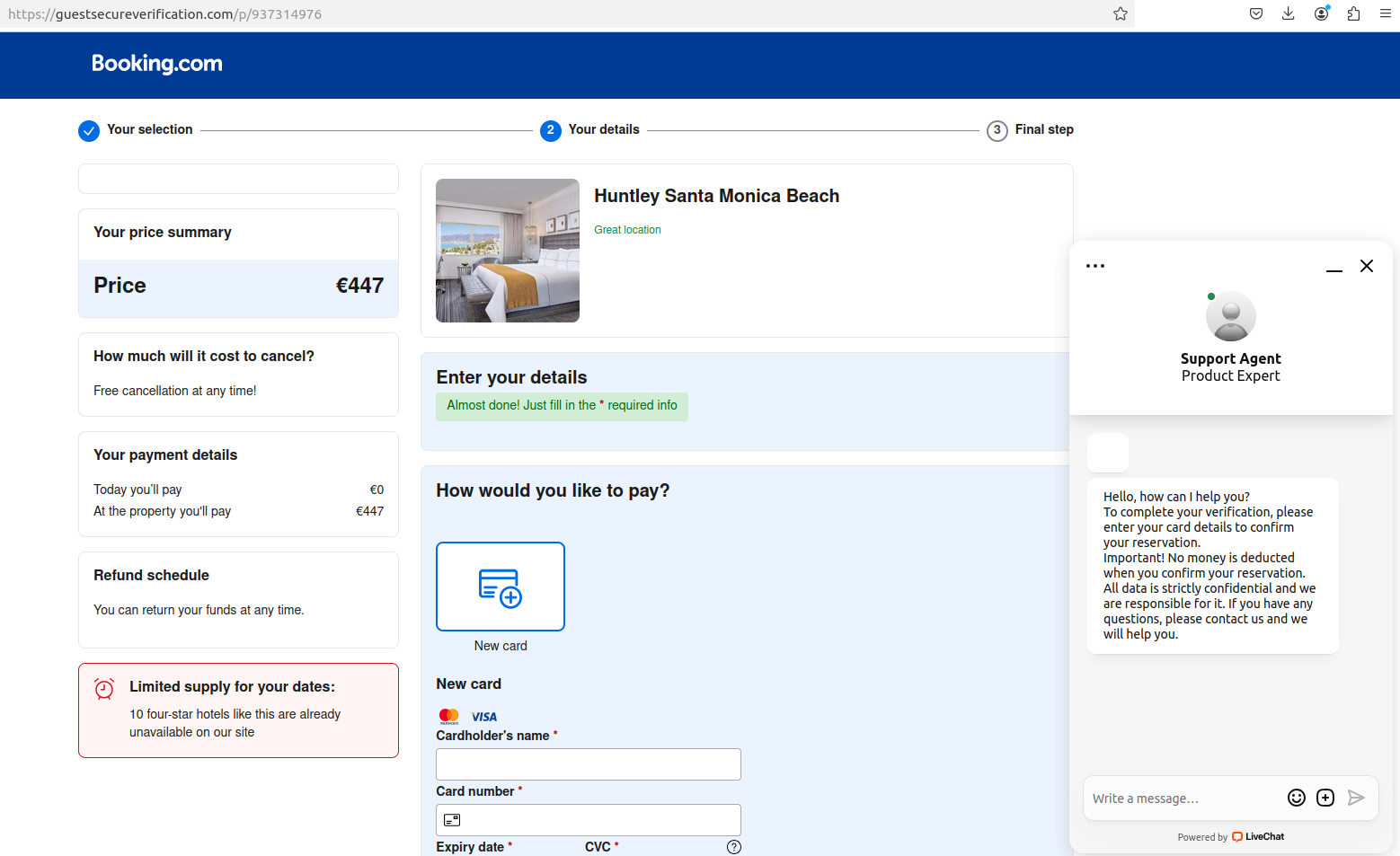
The phony booking.com website generated by visiting the link in the text message.
Booking.com said it now requires 2FA, which forces partners to provide a one-time passcode from a mobile authentication app (Pulse) in addition to a username and password.
“2FA is required and enforced, including for partners to access payment details from customers securely,” a booking.com spokesperson wrote. “That’s why the cybercriminals follow-up with messages to try and get customers to make payments outside of our platform.”
“That said, the phishing attacks stem from partners’ machines being compromised with malware, which has enabled them to also gain access to the partners’ accounts and to send the messages that your reader has flagged,” they continued.
It’s unclear, however, if the company’s 2FA requirement is enforced for all or just newer partners. Booking.com did not respond to questions about that, and its current account security advice urges customers to enable 2FA.

A scan of social media networks showed this is not an uncommon scam.
In November 2023, the security firm SecureWorks detailed how scammers targeted booking.com hospitality partners with data-stealing malware. SecureWorks said these attacks had been going on since at least March 2023.
“The hotel did not enable multi-factor authentication (MFA) on its Booking.com access, so logging into the account with the stolen credentials was easy,” SecureWorks said of the booking.com partner it investigated.
In June 2024, booking.com told the BBC that phishing attacks targeting travelers had increased 900 percent, and that thieves taking advantage of new artificial intelligence (AI) tools were the primary driver of this trend.
Booking.com told the BCC the company had started using AI to fight AI-based phishing attacks. Booking.com’s statement said their investments in that arena “blocked 85 million fraudulent reservations over more than 1.5 million phishing attempts in 2023.”
The domain name in the phony booking.com website sent to our reader’s friend — guestssecureverification[.]com — was registered to the email address ilotirabec207@gmail.com. According to DomainTools.com, this email address was used to register more than 700 other phishing domains in the past month alone.
Many of the 700+ domains appear to target hospitality companies, including platforms like booking.com and Airbnb. Others seem crafted to phish users of Shopify, Steam, and a variety of financial platforms. A full, defanged list of domains is available here.
A cursory review of recent posts across dozens of cybercrime forums monitored by the security firm Intel 471 shows there is a great demand for compromised booking.com accounts belonging to hotels and other partners.
One post last month on the Russian-language hacking forum BHF offered up to $5,000 for each hotel account. This seller claims to help people monetize hacked booking.com partners, apparently by using the stolen credentials to set up fraudulent listings.
A service advertised on the English-language crime community BreachForums in October courts phishers who may need help with certain aspects of their phishing campaigns targeting booking.com partners. Those include more than two million hotel email addresses, and services designed to help phishers organize large volumes of phished records. Customers can interact with the service via an automated Telegram bot.
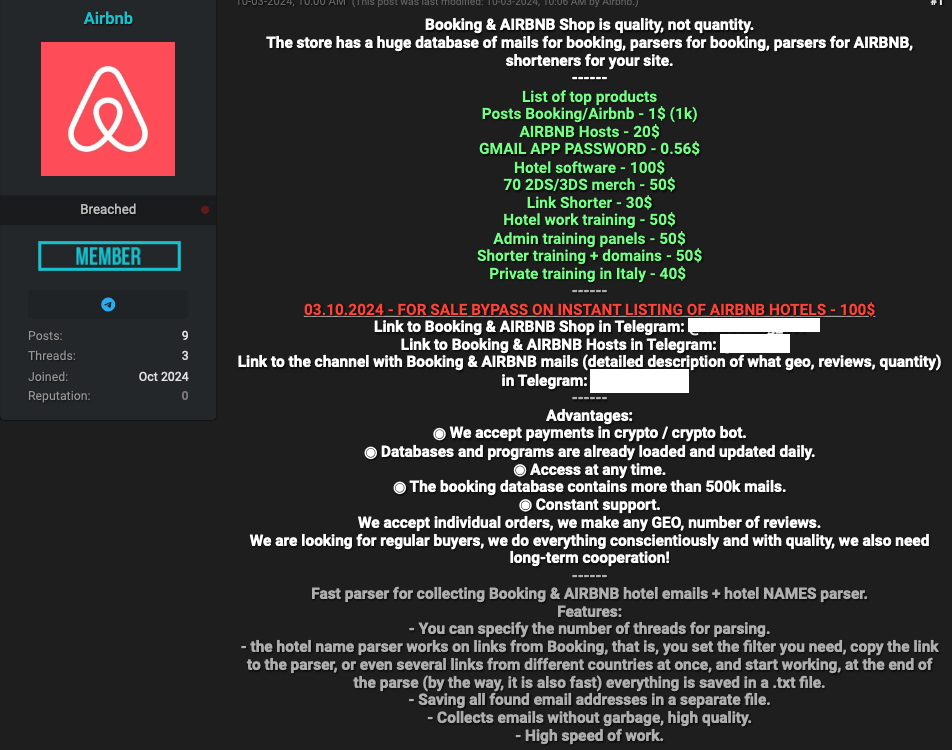
Some cybercriminals appear to have used compromised booking.com accounts to power their own travel agencies catering to fellow scammers, with up to 50 percent discounts on hotel reservations through booking.com. Others are selling ready-to-use “config” files designed to make it simple to conduct automated login attempts against booking.com administrator accounts.
SecureWorks found the phishers targeting booking.com partner hotels used malware to steal credentials. But today’s thieves can just as easily just visit crime bazaars online and purchase stolen credentials to cloud services that do not enforce 2FA for all accounts.
That is exactly what transpired over the past year with many customers of the cloud data storage giant Snowflake. In late 2023, cybercriminals figured out that while tons of companies had stashed enormous amounts of customer data at Snowflake, many of those customer accounts were not protected by 2FA.
Snowflake responded by making 2FA mandatory for all new customers. But that change came only after thieves used stolen credentials to siphon data from 160 companies — including AT&T, Lending Tree and TicketMaster.